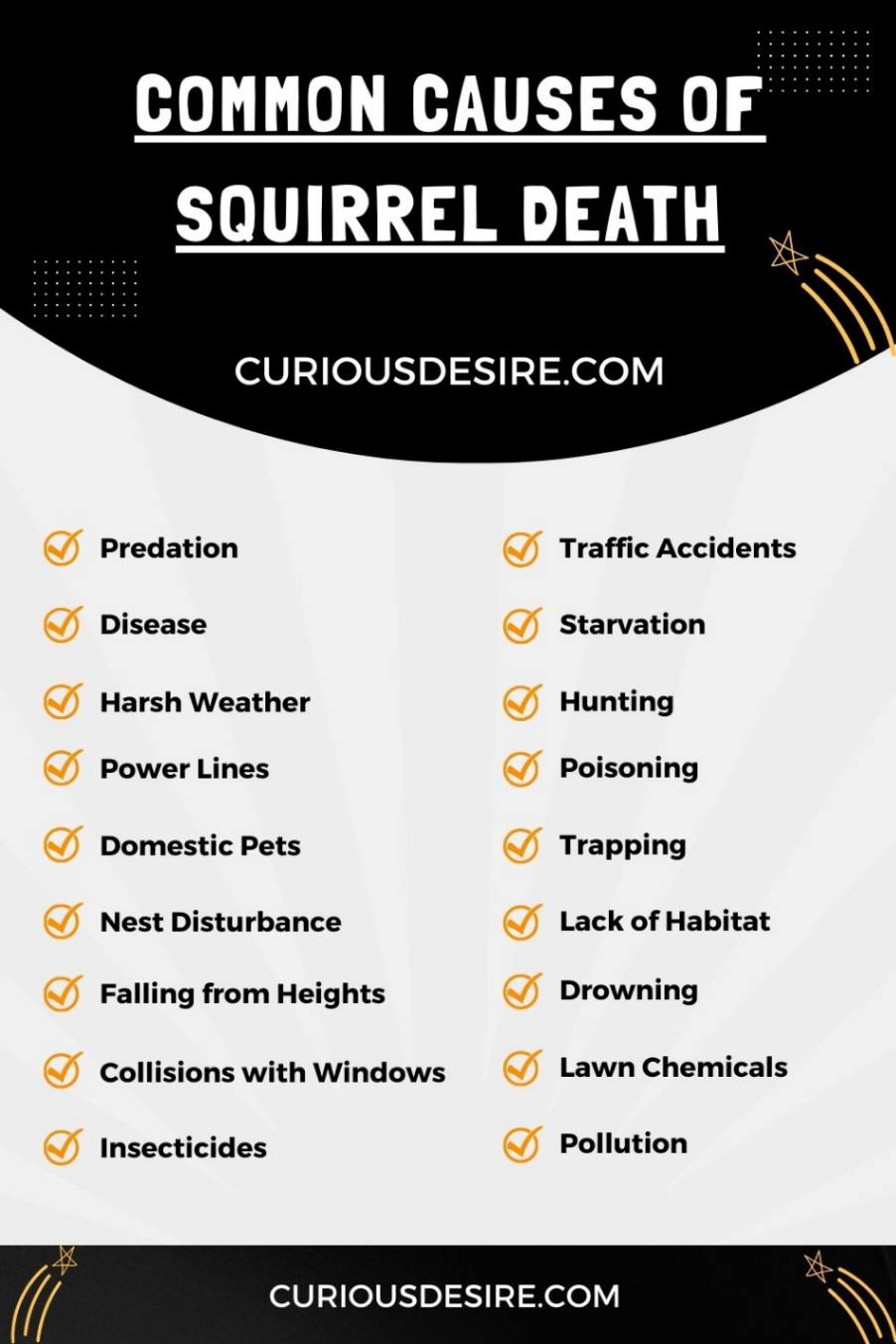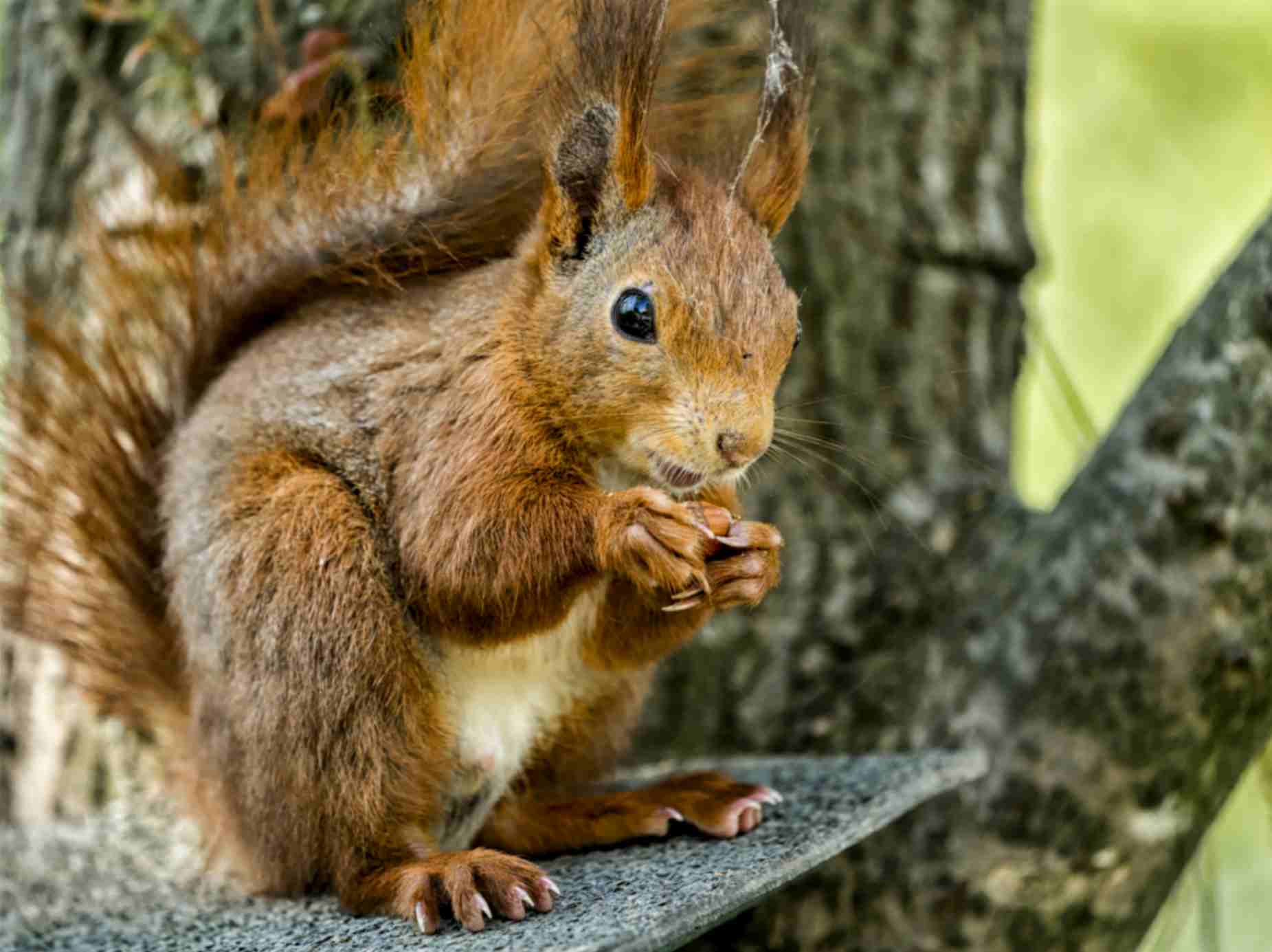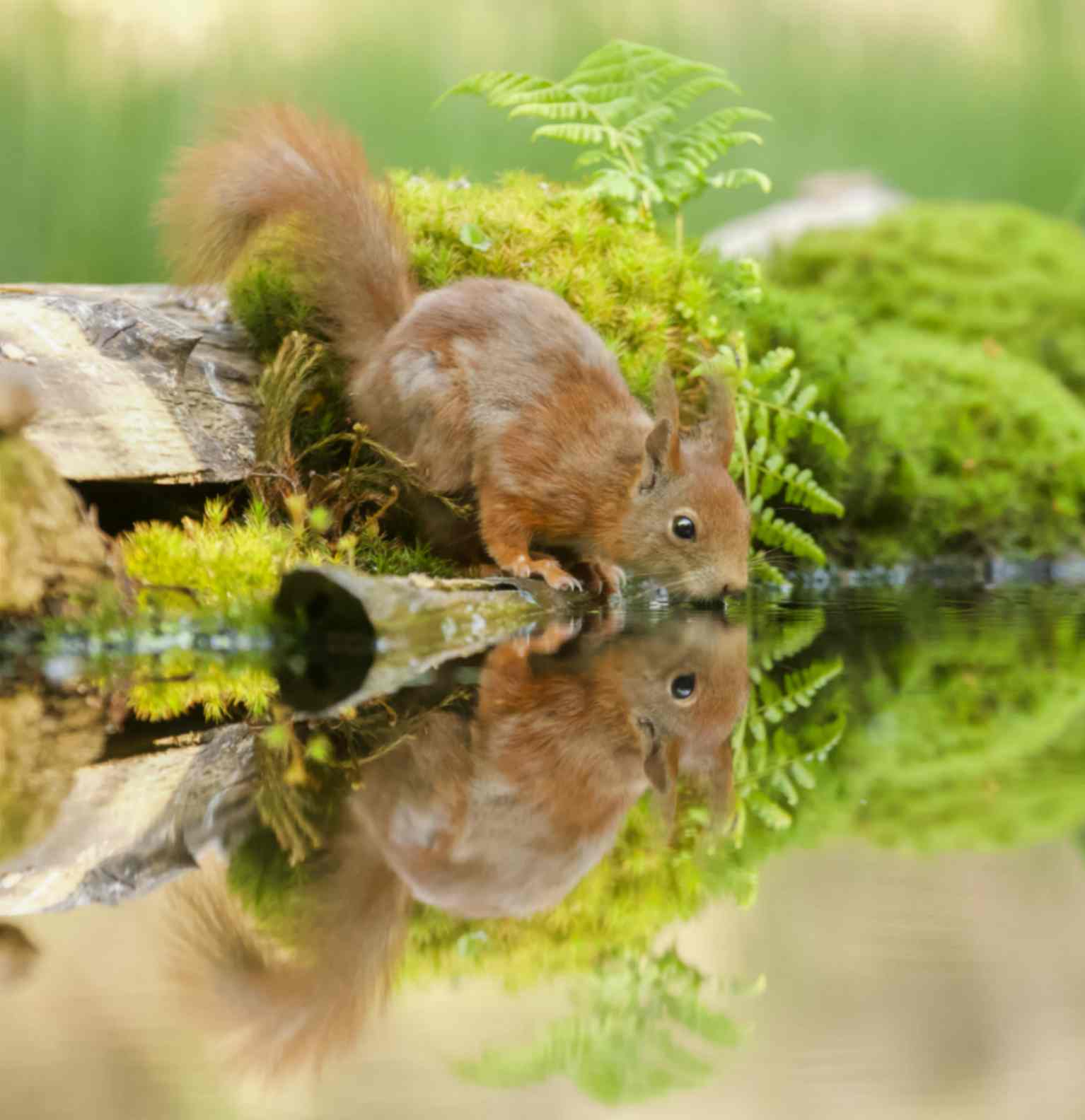Squirrels are like our cute, furry friends that make us happy with their playful ways. Squirrels matter because they play an important role in keeping our surroundings healthy and vibrant.
From planting new trees to balancing nature’s family, these small creatures contribute to the beauty and balance of our ecosystems.
But sometimes, things happen that can make them go away. It’s like understanding why they might face problems – whether it’s finding food or staying safe.
Understanding the reasons behind squirrel deaths is important to protect and preserve their vital role in the intricate web of life.
By caring for squirrels, we contribute to maintaining the well-being of our natural world and ensuring that these tiny heroes continue to flourish in their environments.
Here are the 5 most common causes of squirrel death:
- Traffic Accidents
- Disease
- Starvation
- Hunting
- Collisions with Windows
1. Predation
Predation refers to the act of a predator hunting and consuming squirrels as prey. Natural predators include animals like birds of prey (hawks, owls), snakes, foxes, and domestic pets.
For example, imagine a hawk soaring through the sky, spotting a squirrel on the ground. With its sharp talons and keen eyesight, the hawk swiftly swoops down, capturing the squirrel for a meal.
To help protect squirrels from predation, consider providing natural cover in your yard, such as bushes or dense shrubbery. If you have a pet cat, keep it indoors to prevent it from hunting squirrels.
Creating an environment that offers hiding spots can increase the chances of a squirrel escaping from potential predators.
2. Traffic Accidents
Vehicles are a big danger for squirrels in many ways. Think about a busy city where lots of cars and squirrels share the streets. One big problem is traffic accidents. Imagine a curious squirrel trying to cross the road.
Suddenly, it gets surprised by cars and, sadly, gets hit by one. To help squirrels stay safe, drivers in areas with lots of trees or parks need to be careful.
Slow down if you see a squirrel trying to cross. If it’s safe, stop to let them go. Doing these simple things can help keep squirrels from getting hurt by cars.
Increased awareness and cautious driving or cycling can significantly decrease traffic accidents involving squirrels.
3. Disease
Squirrels can face various diseases, such as squirrel pox or mange, which are contagious and can spread through contact or contaminated environments.
Consider a scenario where a squirrel in a local park catches a contagious disease. As it interacts with other squirrels or shares common spaces like feeding areas, the illness can spread within the population, affecting multiple squirrels.
The following are the ways to handle a situation where squirrels are facing diseases:
- Observation: Keep an eye out for squirrels showing signs of illness, such as fur loss, lethargy, or changes in behavior.
- Isolation: If possible, isolate visibly sick squirrels from the healthy population to prevent the spread of the disease.
- Contact Authorities: Report any instances of sick squirrels to local wildlife authorities or animal control.
- Avoid Feeding: During disease outbreaks, it’s advisable to avoid feeding squirrels to discourage clustering and potential disease transmission.
- Consult Professionals: Seek advice from wildlife experts or veterinarians for proper diagnosis and treatment options.
4. Starvation
Starvation happens when squirrels have a tough time finding enough food, particularly in urban areas where foraging options are limited.
For instance, imagine a city with few green spaces. In such a place, a squirrel could struggle to find nuts or seeds, making it hard to get enough to eat. This scarcity can lead to malnutrition and, ultimately, starvation for the squirrel.
To help squirrels during tough times, especially in winters when food is scarce, support local wildlife by placing bird feeders with squirrel-friendly food.
Planting trees that provide food for squirrels and setting up small feeding stations can offer extra resources when they need it most.
5. Harsh Weather
Extreme weather conditions, such as severe storms, heavy snowfall, or prolonged periods of extreme cold, can pose a threat to squirrels.
Imagine a winter storm with heavy snowfall. Squirrels may struggle to find food buried under layers of snow, and the harsh cold can be harmful to their survival.
During extreme weather, consider providing shelters like nest boxes or extra food in inaccessible locations. Creating windbreaks with vegetation can also offer protection from severe weather conditions.
6. Hunting
Squirrels are in trouble when people hunt them, either for fun or to control pests. This happens in different places, like woods or cities, where individuals might go after these little animals, either on purpose or by accident.
For instance, think about a big forest where hunters are looking for bigger animals. Sometimes, they might shoot at squirrels without meaning to. This hunting, whether for sport or pest control, can mess up the lives of squirrels.
To keep squirrels safe from hunting, we need to talk about using better rules for how we treat animals. We should explain to others why it’s important to keep nature balanced.
It’s also good to support rules that protect places where squirrels live, making sure they have a safe home. By doing these things, we can help make sure that squirrels and people can share the same space without causing harm.
7. Poisoning
Poisoning occurs when squirrels ingest toxic substances intentionally or unintentionally left in their environment, often as a method of pest control.
For example, In a suburban setting, someone might use rat poison to control pests. Squirrels, in their search for food, might consume the poison, leading to severe consequences.
Choose humane and environmentally friendly pest control methods to avoid unintentional harm to squirrels. If poisoning is suspected, contact local wildlife authorities for assistance in dealing with the situation safely.
8. Power Lines
Squirrels can be in trouble when they get too close to power lines with electrical equipment, which can lead to them getting a dangerous electric shock. To keep squirrels safe, we can do a couple of things.
- Install Squirrel Guards: Add protective squirrel guards to power lines. These guards create a barrier, making it challenging for squirrels to touch the wires.
- Clear Surroundings: Keep the area around power lines free from excessive plants and trees. This reduces the likelihood of squirrels attempting risky maneuvers or getting too close to the wires.
By doing these simple things, we make sure that squirrels can move around without getting hurt by electricity.
9. Trapping
People might use trapping as a way to catch squirrels, often for reasons related to pest control or relocating them.
Imagine someone in an urban area noticing squirrels causing a bit of trouble, like getting into attics or gardens. In an attempt to address the issue, they might set up traps to catch and remove the squirrels elsewhere.
However, it’s important to be mindful of the stress and potential harm trapping can cause to these small creatures.
Consideration of alternative, humane methods is encouraged to ensure the well-being of both the squirrels and the environment they inhabit.
10. Domestic Pets
Our furry friends, like cats and dogs, can be harmful to squirrels when they play too rough or try to catch them.
Picture a backyard where a happy dog is chasing a squirrel for fun. Even though the dog doesn’t want to hurt the squirrel, the game can stress out the little creature or even cause injuries.
To make sure squirrels stay safe, it’s a good idea to keep our pets inside or watch them when they’re outside. This way, they won’t go after squirrels. Encourage responsible pet ownership to create a safer environment for both pets and wildlife.
11. Nest Disturbance
Sometimes, when people or activities interrupt or damage squirrel nests, it can cause a lot of problems for these little creatures.
They build nests in trees to keep them safe and warm, but if someone trims trees without knowing there’s a nest, it can disturb the squirrels. This disturbance can be stressful for the squirrels, and they might have to find a new place to live.
To avoid this, before doing any tree trimming or construction work, it’s a good idea to check for squirrel nests.
If you find one, wait until the babies are old enough to leave. This way, you make sure the squirrels have a safe and secure place to live.
12. Lack of Habitat
Squirrels can face problems when they don’t have enough places to live because their natural homes are disappearing.
For instance, imagine a town expanding with more houses and roads. The green areas where squirrels used to play and live get replaced by buildings. Now, the squirrels have fewer places to find food and make their homes.
To help squirrels, it’s important to support keeping natural areas safe. Planting trees and making sure there are green spaces in cities gives squirrels the homes they need to live happily.
13. Falling from Heights
Squirrels can get hurt or even die when they fall from high places like trees or buildings. This happens if they make a mistake while jumping or if they encounter dangers like predators.
For example, think about a squirrel trying to jump from one tree branch to another. If it doesn’t judge the distance right, it might fall to the ground, risking getting hurt.
To keep squirrels safe, it’s important to watch them from a distance when they’re up high. Avoid doing things that might scare them and make them fall. Also, providing trees that are good for squirrels can help reduce the chances of accidents.
14. Drowning
Squirrels might face the danger of drowning when they go near water, like ponds or bird baths, especially if the edges are steep or slippery.
For instance, imagine a squirrel going to a bird bath for a drink. If the edges of the bird bath are steep, and there’s no way for the squirrel to climb out, there’s a risk of drowning.
To prevent this, it’s helpful to provide water sources with shallow areas and gradual slopes. This way, squirrels can easily drink without the risk of accidentally falling in. Regularly checking water features ensures they remain safe for the wildlife around.
15. Lawn Chemicals
Lawn chemicals, like fertilizers and pesticides, can be harmful to squirrels when used in yards and gardens. These chemicals can affect the squirrels when they eat plants treated with them or when they come in contact with the chemicals directly.
For example, picture a neighborhood where people are using fertilizers and pesticides to make their lawns look nice.
Squirrels, while searching for food, might nibble on treated plants or come into contact with the chemicals, leading to health issues.
To keep squirrels safe, consider using natural or wildlife-friendly alternatives for lawn care. This way, you maintain a beautiful lawn without putting the squirrels at risk of harmful chemicals.
16. Collisions with Windows
Squirrels can accidentally run into windows, thinking they can continue through the glass. This can lead to injuries or even death.
Imagine a backyard with a bird feeder near a window. A squirrel, while chasing after birds, might not realize there’s glass in front of them and collide with the window.
To prevent window collisions, add decals or objects to windows that make them more visible to squirrels. Placing feeders away from windows can also reduce the chances of accidental collisions.
17. Insecticides
Insecticides, used to control insects in gardens or homes, can pose a threat to squirrels when they come into contact with these chemicals while foraging or exploring.
Think about someone using insecticides in their garden to get rid of bugs. Squirrels, searching for food, might be exposed to these chemicals, leading to potential harm.
When using insecticides, choose ones that are safe for wildlife or apply them in a way that minimizes exposure to squirrels. This helps in keeping the environment free from harmful chemicals.
18. Pollution
Pollution from various sources, like factories or vehicles, can harm squirrels when they breathe in polluted air or drink contaminated water.
Consider an urban area with heavy traffic and factories. The air and water around can contain pollutants that affect the health of squirrels living in that environment.
Support initiatives to reduce pollution and be mindful of proper waste disposal. By minimizing pollution, we contribute to creating a healthier environment for both humans and wildlife, including squirrels.
Why Does Squirrel Life Matter?
Discover why squirrels are more than just cute creatures. From helping plants grow to balancing nature’s family, here’s a peek into why the little world of squirrels matters in big ways.
1. Seed Dispersal
Squirrels are natural seed dispersers. As they bury and forget about nuts and seeds, they unintentionally plant new trees and vegetation, helping in forest regeneration and maintaining biodiversity.
2. Ecosystem Health
Squirrels serve as prey for various predators, contributing to the intricate web of life in ecosystems. Their presence helps maintain a healthy population of predators, ensuring ecological stability.
3. Forest Renewal
By creating burrows and nests, squirrels enhance soil aeration and nutrient distribution. Their activities promote the growth of vegetation, helping in the renewal of forests and green spaces.
4. Biodiversity Support
Squirrels are a part of the diverse wildlife in our surroundings. Their interactions with other species, from birds to insects, contribute to the overall biodiversity of ecosystems.
5. Pollination Assistance
While foraging for nectar and pollen, squirrels inadvertently assist in pollination. This activity benefits flowering plants and helps sustain a variety of plant species.
6. Indicators of Environmental Health
The presence and behavior of squirrels can act as indicators of the health of local environments. Changes in their populations or behavior may signal shifts in ecological conditions.
7. Enjoyment for Humans
Squirrels bring joy and amusement to people of all ages. Observing their playful antics in urban parks or natural settings promotes a connection between humans and the natural world.
Conclusion
Squirrel deaths, though a bit sad, tell us about the not-so-easy parts of nature. It’s like a little lesson in taking care of our furry friends.
When we understand why they face challenges, it becomes our job to create places where they can be safe and happy.
Caring for squirrels is like being the protector of their little stories in the wild. It’s all about making sure our world stays lively and beautiful. Every small thing we do to keep our tiny buddies safe adds to the wonderful picture of nature around us.
So, by looking out for them, we’re not just caring for squirrels; we’re making our shared world a better, brighter place.
Common Causes of Squirrel Death FAQs
1. Why do squirrels sometimes pass away in our neighborhoods?
Squirrels face challenges like finding enough food and staying safe from dangers like cars and predators. Just like people, they have tough times too.
2. Are cars a danger to squirrels?
Yes, cars can be risky for squirrels when they try to cross roads. We need to drive carefully, especially in areas with lots of trees, to keep our furry friends safe.
3. Can people help squirrels when they’re sick?
Absolutely! If you see a squirrel that looks sick or hurt, telling wildlife experts or animal control can help them get the right care and medicine they need to feel better.
4. Do squirrels get hurt by windows?
Yes, sometimes squirrels don’t realize there’s glass in windows, and they might accidentally bump into them. Adding stickers or objects to windows can help them notice and avoid getting hurt.
5. How can we make sure squirrels have enough food?
We can help by setting up bird feeders with snacks that squirrels love, like nuts and seeds. Also, planting trees that produce nuts gives them a natural source of food to keep them happy and healthy.
6. Is pollution a problem for squirrels?
Yes, pollution from cars and factories can be bad for squirrels and their homes. Supporting efforts to reduce pollution, like using cleaner energy, helps keep the air and water clean for squirrels to breathe and drink safely.
7. Why is it important to check for squirrel nests before trimming trees?
Squirrels build their homes, called nests, in trees. Checking for nests before trimming helps protect their homes, making sure baby squirrels and their families stay safe and cozy.
8. Can pets harm squirrels?
Yes, pets like cats and dogs can accidentally chase or hurt squirrels when they play outside. Keeping pets indoors or watching over them while outside helps keep both pets and squirrels safe and happy.


